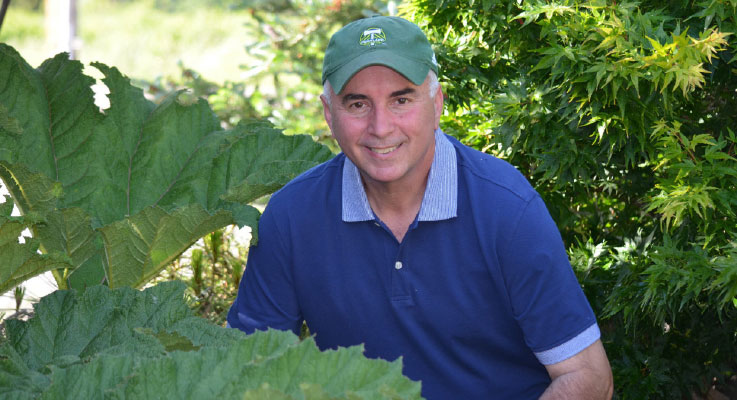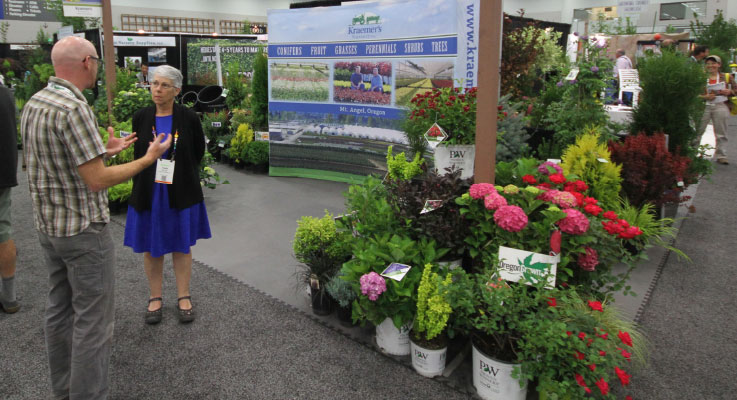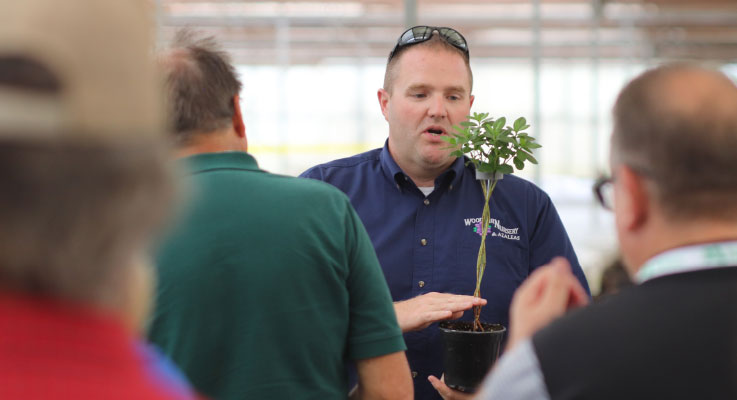Wholesale nurseries find personal service and relationships are still key for making the sale
Many nurseries no longer input orders manually, in some cases saving hundreds of work hours monthly. Smartphones have become indispensable as nurseries snap photos of plants and shoot them across the country in a matter of seconds.
And in response to COVID-19 restrictions over the past two years, nurseries relied on advanced technological communications to maintain relationships.
Nursery executives say that technology has changed the way they do business. Still, when it comes to working with wholesalers, good old fashioned personal relationships trump everything. They always have and probably always will.
“Relationships are paramount,” said Vinny Grasso, West Coast nursery manager for Eason Horticultural Resources, which is headquartered in Ft. Wright, Kentucky. “Technology helps, but the bonding between the buyer and the seller is everything. People buy from who they like. That is a principle that is probably a thousand years old.”
“Digital communication has enhanced our ability to execute the day-to-day work that we do,” said Ken McVicker, sales manager for Woodburn Nursery & Azaleas Inc. in Woodburn, Oregon. “But growing our business together really does fundamentally come back to our relationships with our customers.”
Lars Nilsen, executive vice president of sales and marketing for Smith Gardens in Bellingham, Washington, said he has been working with many of the same buyers for years in servicing the garden centers at Home Depot, Lowe’s Home Improvement, Walmart, Fred Meyer and Costco in the Northwest and Alaska. Knowing your buyer is critical in helping a business improve performance, he said.
“When you have the same buyer for eight, 10, 15 years, you get to know each other,” Nilsen said. “They know our strengths. We know their focus areas and likes and dislikes, and what they pay attention to. And so, that kind of relationship becomes more of a partnership.”
Treda McCaw, sales associate for Kraemer’s Nurseries Inc., said customer service at the Mount Angel, Oregon, company is emphasized in every position and in every activity an employee performs, no matter if the job holder does or doesn’t interact with the public.
“It is the person who opens the door and meets the driver. It is somebody pulling decent plants and putting the right tags on the plant, or it is somebody communicating that maybe something doesn’t look good and we really shouldn’t be shipping it right now,” McCaw said. “Every position we have needs to be considered customer service, because our business doesn’t stop when we ship to the garden center. The garden center has to sell it. All of these things we need to keep in mind, even as we are writing the order.”

Technology brings changes
Many of the changes technology has brought to the industry have served to improve customer relations, executives said, in part because of improved efficiencies.
“Early on, before technology changed some of what we do, it was a lot of telephone calls and getting orders by FAX and even by letter,” McVicker said. “Fast forward to today, and the orders go straight into our computer system, right into our software. So, we can key in the order, just upload it into our system, maybe make some modifications and send it right back electronically.
“For our industry that is a pretty significant change, and it benefits both our businesses,” he said.
The advent of the smartphone also is a significant change from days past, nursery executives said, and a change that helps both ends of the spectrum.
“Phone cameras are awesome,” McCaw said. “I can snap a photo and send it directly to the customer or to the sales rep. That part of technology is really nice, because it is instant.”
Especially during COVID, technology has helped companies maintain solid customer relations in lieu of meeting face-to-face, executives said.
“If this had happened 10 years ago,” Nilsen said of COVID disruptions, “that would have been an issue. But since Zoom, GoToMeeting and Microsoft Teams have blossomed, that certainly helped us stay in touch.”
Walking stores
One of COVID-19’s biggest disruptions was that it prohibited nursery companies from walking stores with buyers. That is customarily a critical part of customer relations, executives said.
McVicker said Woodburn Nursery & Azaleas typically travels to two or three of its principal markets each year, a routine it was forced to abandon the last two years. “We try to be proactive about getting out and seeing them where they conduct their business, so we have a better sense of their customer-base expectations,” he said. “It helps us to be in the marketplace and hear from our customers on their challenges, so we can help them meet their challenges and improve our products to help them reduce their challenges and grow their business.
“We look at our customers as our storefront, and if we can help them turn product at their storefront, it helps us turn product.”
Nilsen of Smith Gardens agreed that walking stores should be a critical part of a nursery’s business protocol, both from a relationship standpoint and to see how a store’s operations are proceeding.
“The main benefit of walking stores is to see how we are executing,” Nilsen said. “Is the quality up to snuff? Is the merchandising done correctly? Are the perennials where they are supposed to be? Are the annuals where they are supposed to be? Are the more expensive items, or special items, up front and center? Have we done proper culling? The reality of our business is that sometimes the plants suffer or die. Those plants need to make room for fresh product. The test is: Would you by it for your mom? If the answer is ‘No,’ then it should get culled or go to clearance.
“And it is about evaluating a plant’s performance. Maybe a plant doesn’t look good this year, so let’s do something else next year. So, you talk about ideas,” he said. “And sometimes we get critical feedback during those walk-throughs, and it is important.”
McVicker noted that while Woodburn Nursery & Azaleas didn’t get out to its markets the last two years, he was glad to see customers come to them last spring and summer.
“One of the things about our industry is we don’t sell widgets in boxes on shelves,” McVicker said. “We sell live goods that are different from one grower to the next, and the marketplace is variable. And so, I think that intimate connection — that customer service — is still very, very important to grow our business with our wholesalers and our retailers.”

Skyrocketing demand
Among challenges nurseries have faced in customer service over the past couple of years has been meeting customer needs in the face of rising demand.
McVicker said the Woodburn nursery has dealt with the demand increase by ensuring customers get at least what they got the year before, and then meeting the increases when and where it could.
“If there is an increase in a given product line, then we try to meet that demand,” he said, “but the astronomical demand that we’ve seen the last two years was not forecast four or five years ago when we did production planning, so we have not been able to meet everybody’s demand.
“Our crops are anywhere from three to five, six years in the making before they get to the marketplace, so it takes a while to ramp that up and get that deployed into the market,” he said. “We apologize that we can’t do more, let them know we are doing the best we can, and sit down with them and forecast what their needs are and adjust our production to meet those needs the best we can.”
Asked if the nursery has lost customers, McVicker said: “I don’t think so, because we’ve done a good job of supplying at least what we did the year before to them. But, I think customers have probably had to search deeper to find additional product.”
Nilsen said Smith Gardens regularly plants extra to meet customer demand, primarily to be prepared for shortages that can crop up in the case of a late frost or a particularly aggressive plant disease. Between the extra supplies built into its business model and, in some cases, substituting product from other nurseries, the company has been able to fill orders the last two years.
“What we do is to plan to make sure that our customers’ sales grow year after year, that their margin maintains or grows, and that shrink is held to a minimum,” he said. “As long as we are checking off those boxes, we feel that we are in good shape with the buyer.”
Mitch Lies is a freelance writer covering agricultural issues based in Salem Oregon. He can be reached at [email protected].




